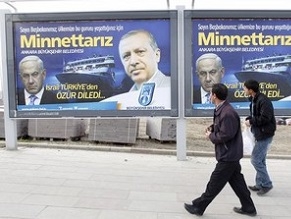|
World Jewish News

Billboards put up in Ankara to thank Erdogan for getting Israel to apologize for Marmara incident. Photo: REUTERS/Umit Bektas
|
'Most Israelis don't believe Netanyahu's apology to Turkey was justified'
08.07.2013, Israel and the World A much higher percentage of Israeli Arabs (23 percent) than Jews (5%) believe anti-Semitism and hatred of Jews is the main factor animating Turkish Prime Minister Recep Tayyip Erdogan’s relationship with Israel, according to a poll released Sunday.
The poll, sponsored by the Begin-Sadat Center for Strategic Studies, found that both Israeli Arabs and Jews believe that preserving Turkey’s standing in the Arab world was the most important factor behind Erdogan’s position toward Israel.
The poll also found that an overwhelming 71% of Israelis did not feel Prime Minister Binyamin Netanyahu’s apology to Turkey for the 2010 Mavi Marmara incident was justified. That part of the survey was first widely reported a week ago in the Turkish media when BESA head Efraim Inbar presented those findings at a panel on Israeli-Turkish relations held in Istanbul.
According to the survey, only 28% of Israelis believe that Israeli-Turkish ties will improve in the coming years under Erdogan.
While 42% of the respondents said they expected the relations to stay the same, 30% predicted they would further deteriorate.
Following Netanyahu’s apology in March to Erdogan for any operational errors on the Mavi Marmara that might have led to a loss of life, Israel and Turkey launched talks for compensation to be paid to the families of the nine Turks killed on the boat trying to break Israel’s blockade of Gaza. Those talks have stalled, as has the normalization of relations that were expected to be capped by an exchange of ambassadors.
Turkey recalled its ambassador shortly after the Mavi Marmara incident and expelled Israel’s ambassador in 2011.
While the tone of the strong Israeli-Turkish ties began to change for the worse soon after Erdogan and his Islamic-rooted AK party won the Turkish elections in 2002, the dramatic public slide in the relationship took place following Operation Cast Lead in Gaza in 2008-2009. Before that, however, Turkey was a favorite tourist destination for Israelis.
According to the survey, 85% of Israelis said the chances that they would vacation in Turkey in the near future were slim or nonexistent; 5% said there was a good to certain chance that they would visit; and 10% said they might.
The survey was conducted by Maagar Mochot between June 16-19 among a representative sample of 605 Israeli adults. The poll had a plus or minus 4.5% margin of error.
According to the Turkish media, Inbar stirred a controversy at the Istanbul symposium by saying that Israel may have to revise its position on the Kurdish issue if Turkey became more hostile toward Israel.
The full survey was released in Israel on Sunday in advance of a symposium on Turkey’s domestic and foreign policy, to be held Wednesday at the BESA center.
By HERB KEINON
JPost.com
|
|
